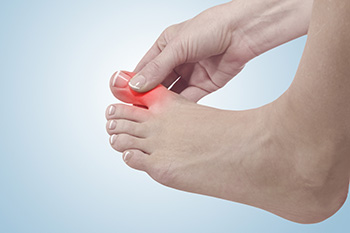
Gout, a form of inflammatory arthritis, is caused by the buildup of uric acid crystals in the joints, leading to intense pain and swelling. Gout often affects the feet, particularly the big toe. It can result from a diet high in purines, found in red meat, seafood, and alcoholic beverages. Obesity, and certain medical conditions like high blood pressure and diabetes are other contributing factors. Symptoms of gout typically include sudden, severe attacks of pain, redness, and tenderness in the affected joint, often occurring at night. The skin surrounding the toe joint may appear shiny and feel warm to the touch. Recurrent gout attacks can lead to chronic joint damage and the formation of tophi, which are hard deposits of uric acid crystals under the skin. Managing gout involves lifestyle changes such as dietary adjustments, maintaining a healthy weight, and staying hydrated, in addition to medications that reduce uric acid levels and inflammation. If you are experiencing toe pain from a flare-up of gout, it is suggested that you schedule an appointment with a chiropodist for an exam and appropriate treatment.
Gout is a painful form of arthritis that can affect anyone. Please consult with one of the chiropodists from Complete Family Footcare & Therapy. Our clinicians will assess your condition and provide you with quality foot and ankle treatment.
What Is Gout?
Gout is characterized by sudden, severe attacks of pain, redness, and tenderness in the joints. This type of arthritis is caused by a buildup of uric acid in the bloodstream. When uric acid crystallizes in a joint, often the joint of the big toe, it can bring about a gout attack.
Symptoms
Symptoms of gout include:
Sudden and severe pain
Swelling
Redness
Warmth
Joint stiffness
Joint deformity
Diagnosis
A chiropodist will ask questions about your personal and family medical history, followed by an examination of the affected joint. Laboratory tests and x-rays are sometimes ordered to determine if the inflammation is caused by something other than gout. A sample of fluid taken from your joint can show whether it contains uric acid.
Treatment
Prescription medications or injections are used to treat the pain, swelling, and inflammation. Patients with chronic gout can also use behavioral modifications such as diet, exercise, and decreased intake of alcohol to help minimize the frequency of gout attacks. Foods and beverages that are high in purines should be avoided since purines are converted in the body to uric acid. If left untreated, this painful condition can leave your joint permanently damaged and swollen.
If you have any questions, please feel free to contact our offices located in . We offer the newest diagnostic and treatment technologies for all your foot care needs.
